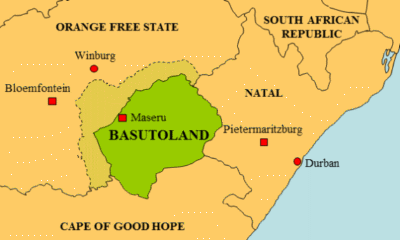 SKC Films Library SKC Films Library |
|
|
| SKC Films Library >> General and Old
World History >> Africa >> Lesotho |
| Basutoland the British protectorate that became Lesotho Basutoland's origins trace back to Moshoeshoe, a Basotho chief who began consolidating various scattered Bantu-speaking tribes against Zulu invaders. He established a fortress capital at Thaba Bosiu in the tableland north of the Maloti in 1824, and declared himself King Moshoeshoe I in the 1830's. During Moshoeshoe's reign there were a series of clashes with the Boers of the Orange Free State, the British, and with other native tribes. Despite a certain amount of success in battle and Moshoeshoe's skillful diplomacy, the kingdom lost considerable territory. A treaty was signed with the Boer from Griqualand in 1843 and an agreement was made with the British in 1853 following a minor war, but disputes with the Boer over land were revived in 1858 and, more seriously, in 1865. Moshoeshoe, appealed to the British for protection, and on March 12, 1868 his country became a British protectorate. A treaty was signed at Aliwal in 1869 between the British and the Boers defining the boundaries of the protectorate, with the arable land west of the Caledon River remaining in Boer hands. Moshoeshoe died in 1870 and disputes over the succession divided the country. In 1871 Basutoland was annexed to the Cape Colony but, in 1884, it was removed from Cape control and came under direct British rule as the Territory of Basutoland. Basutoland was divided into seven administrative disricts -- Berea, Leribe, Maseru, Mohales Hock, Mafeteng, Qacha's Nek and Quthing -- and was ruled by the British Resident Commissioner, who worked through the Pitso (national assembly) of hereditary native chiefs under one paramount chief. Each chief ruled a ward within the territory. The first paramount chief was Lerothodi, the son of Moshoeshoe. During the Second Boer War the colony remained neutral. When the Union of South Africa was founded in 1910 the colony was still controlled by the British and moves were made to transfer it to the Union. The people of Basutoland opposed this, however, and when the South African Nationalist party put its apartheid policies into place the possibility of annexation was halted. In 1959, a new constitution gave Basutoland its first elected legislature. This was followed in April 1965 with a general election. It became independent as Lesotho on October 4, 1966. Prior to its independence, the population of Basutoland was approximately 641,670. |
SKC Films Library >> General and Old World History >> Africa >> Lesotho This page was last updated on March 27, 2017. |
